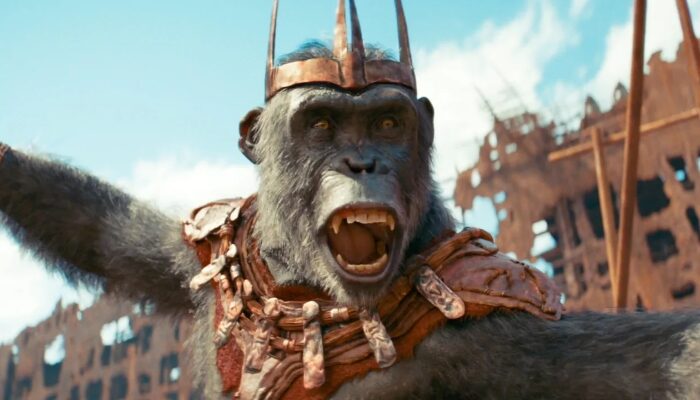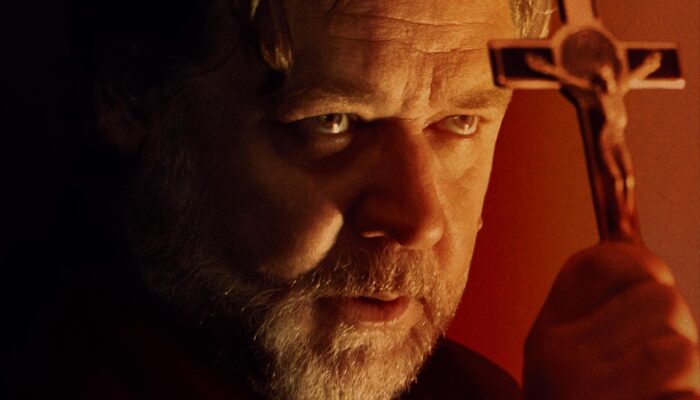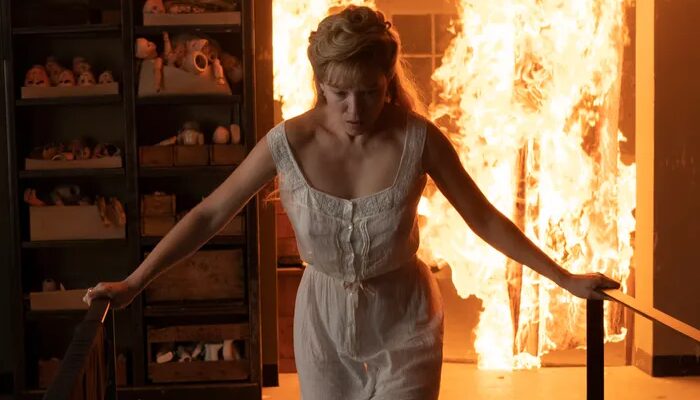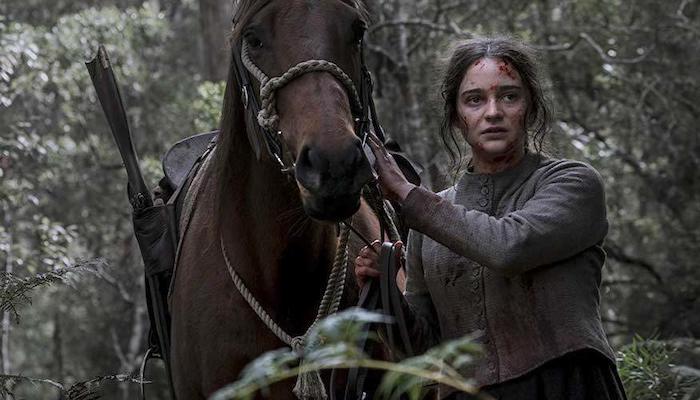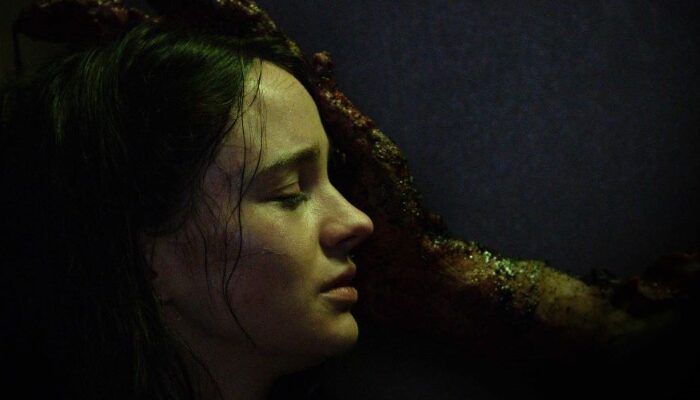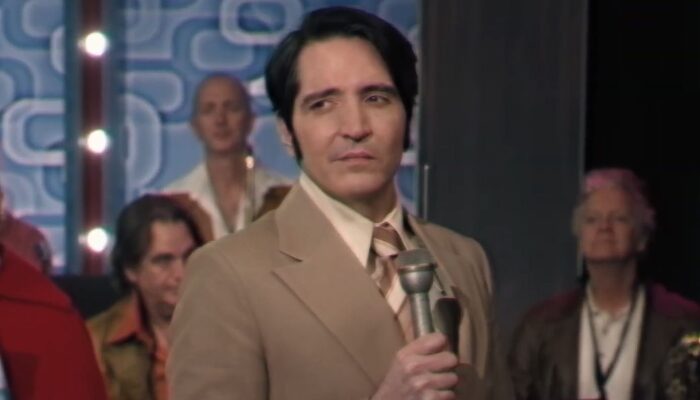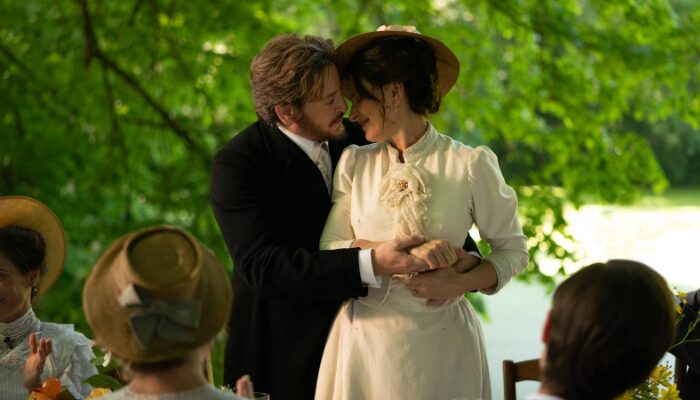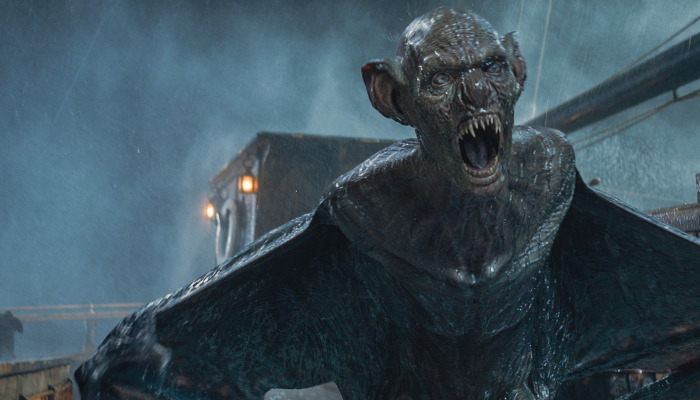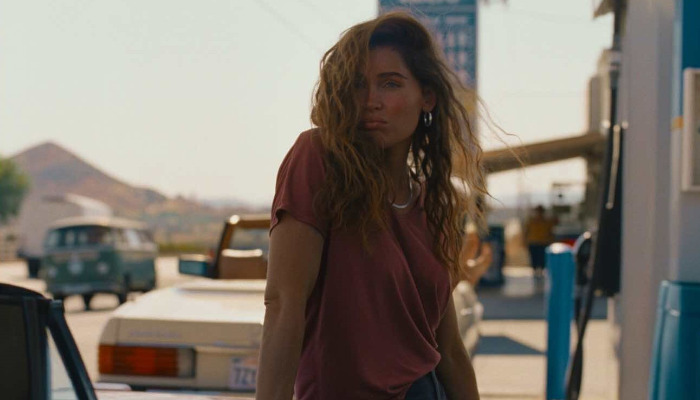Film Review: THE NIGHTINGALE (2018): A Grueling Look at Sadism, Expansionism, & Those Ground under Their Wheels
Table of Contents
The Nightingale Review
The Nightingale (2018) Film Review, a movie directed by Jennifer Kent, and starring Aisling Franciosi, Sam Claflin, Damon Herriman, Ewen Leslie, Baykali Ganambarr, Charlie Shotwell, Nathaniel Dean, Harry Greenwood, Michael Sheasby, Matthew Sunderland, Baykali Ganambarr, Luke Carroll, and Ben McIvor.
The Nightingale may be one of the most unforgiving films that the viewer has ever seen. The barbarism of a civilized society is on full, gory display in Jennifer Kent’s grueling film of revenge and unlikely friendship.
Setting the Stage
Irish convict Clare Carroll (Aisling Franciosi) is the heroine but also the victim in this bleak tale. She, like her eventual companion, go through the greatest range of emotions in the film. The Nightingale is filled with desperate people but their desperation isn’t apparent until they begin interacting with one another.
British Lieutenant Hawkins (Sam Claflin) is drunk on power and the ability to do virtually whatever he wants with whites or blacks within his domain. He has no emotional reactions to his crimes, leading one to deduce that he is a psychopath, much like Stephen Bonnet in Outlander – he presents as one thing in one situation, but when left to his own devices (with no oversight or consequences from superior officers), his malicious actions and self-aggrandizement at the expense of others knows no bounds. Hawkins’ eyes never give away his intentions, his anger. It doesn’t even seem like he enjoys his actions but is being guided by an internal voice, following that voice to ‘completion.’ Lieutenant Hawkins is a voyager on a ship while ‘its’ happening, seeming to want what he has started to be over because it has already begun to bore him.
The Boy
When Lieutenant Hawkins shoots Eddie (Charlie Shotwell), he isn’t shooting a child so much as he is shooting the living incarnation of disappoint. How many times has Hawkins been disappointed by one of his men but wasn’t able to simply rid himself of them and start over. With Eddie, he is able to do that with no court martial and no prison.
Heights of Human Horror
Though they look the same, the multiple rapes Clare endures are different. The first rape she experiences she is able to internalize, while the second and third rapes can’t be internalized because of the absurd level of violence surrounding them i.e. the fact that her family witnesses then shares in her sorrow.
It’s the second and third back-to-back rapes that incidentally desensitize the viewer to the further horrors that they witness in The Nightingale.
From that deplorable vantage plot, nothing else’s compares.
Aisling Franciosi’s Acting
Aisling Franciosi’s performance in The Nightingale is emblematic of Jennifer Lawrence‘s performance in Winter’s Bone – it speaks to the barely tapped power and potential of the actress in question. Franciosi brings raw emotionality to her character (e.g. “Here’s my proof!”) and soulful singing to her portrayal when words will not do.
Why She Can’t Fire
When Clare’s rage bursts forth on one of the killers of her family in the second act of The Nightingale, the viewer believes that this level of hatred, and the acts that it fuels, are sustainable within Clare. By having her rage ebb into fear when she sees Lieutenant Hawkins, the classic and predictable revenge tale is thrown out the window and something else is born in its place.
Clare can’t kill the specter of her life, unable to even raise a fist to him. Hawkins has done something with Clare that he has only been able to accomplish with some of his men – create a sense of abject fear within her. Even-though he is only a man, he has become something else also, a demon, someone to fear if they become angry. If Clare shoots and misses, then what? What would Lieutenant Hawkins do to her, what more would he take from her? Clare’s first kill had no consequences. He was a nobody. Hawkins is a monster and a wounded or pissed off monster is far worse than its normal incarnation.
Open Racism
Racism is everywhere in The Nightingale. It isn’t just found in the oppressors but the oppressed as well. Racism isn’t used as a baseball bat the way it could have been but instead it is used to show that no one, on either side of the words used, is pure or angelic. Everyone is dirty in some way. The racism in this film is an instrument to show that.
Like The Defiant Ones where two representatives of different races are thrown together and must work in unison to survive, so to must Clare and Aboriginal Tasmanian Billy (Baykali Ganambarr) in The Nightingale. Unlike the subtly and elegance of The Defiant Ones, The Nightingale is in-your-face with its racial epithets without the ruminations of their usage and perpetuation in society. Like The Defiant Ones, the figuratively-chained-duo in The Nightingale get to know each other and eventually see what is behind the racial stereotypes, which is all they previously knew of each other.
This, not the need for Clare’s revenge, takes command of the viewer’s attention in the second act of the film all the way to the film’s conclusion. Though the viewer wants Clare to get her revenge, in whatever form that may be, the viewer, to a much larger extent, wants Clare and Billy’s friendship to endure. That becomes more important than Clare’s vengeance. Through their friendship, they both begin to heal from old wounds, some wounds that they didn’t even know were present.
The Real Savages
Aboriginal Tasmanians, referred to as “Blacks” in the film, are seen as sub-human, cannibals, and tools to be used by British soldiers and some of their transportee prisoners. This represents the open contradiction in the film. The British say the aboriginals and the transportees are animals yet the British soldiers and the British citizenry are the ones that commit the most barbaric acts in the film (some repeatedly).
Example: In the third act of the film, British colonists kill a group of captured aboriginals and decapitate one of them for the pleasure of the actions.
Though already answered, these brutish acts beg the questions: Who are the real savages? The powerful or the powerless?
These questions and themes are recurring ones throughout the runtime of The Nightingale.
The Blackbird
The symbolism of the Blackbird in this film is representative of Billy, a person who appears when needed, who saves Clare, and then the real life incarnation of the bird directs her back to civilization – creating a rather clever dichotomy – the Blackbird leads her back to the road but also away from her savagery. The road leads her to Billy, who has a redemptive, humanizing effect on her through his plight and inherent goodness.
When Billy does the dance of the Blackbird for the second and last time in the film, it is beautiful, hopeful, and sad. He is a dead man and so are his people. Though the original symbolism is still there, subtext has been added to it. Billy is dancing on ashes: his own, his peoples, their culture, and their way of life. I don’t know if Clare recognizes any of this but her singing during this key moment in The Nightingale can be seen as a funeral dirge, lamenting the passing of a friend and all that had lead to that moment.
Rating: 8/10
Leave your thoughts on this The Nightingale review and the film below in the comments section. Readers seeking to support this type of content can visit our Patreon Page and become one of FilmBook’s patrons. Readers seeking more film reviews can visit our Movie Review Page, our Movie Review Twitter Page, and our Movie Review Facebook Page. Want up-to-the-minute notifications? FilmBook staff members publish articles by Email, Twitter, Facebook, Instagram, Tumblr, Pinterest, Reddit, and Flipboard.
Related Articles
FilmBook's Newsletter
Subscribe to FilmBook’s Daily Newsletter for the latest news!

